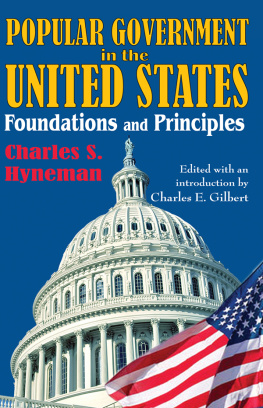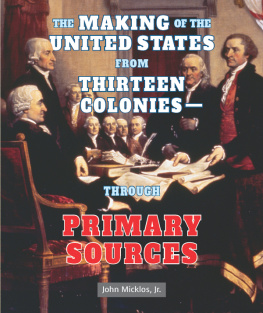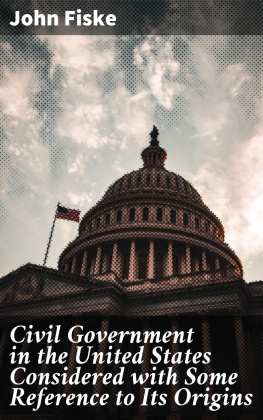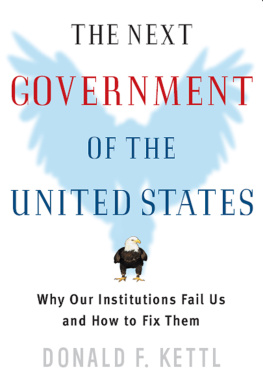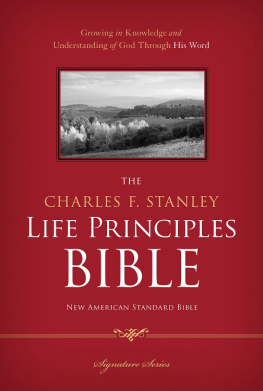First published 1968 by Transaction Publishers
Published 2017 by Routledge
2 Park Square, Milton Park, Abingdon, Oxon OX14 4RN
711 Third Avenue, New York, NY 10017, USA
Routledge is an imprint of the Taylor & Francis Group, an informa business
All rights reserved. No part of this book may be reprinted or reproduced or utilised in any form or by any electronic, mechanical, or other means, now known or hereafter invented, including photocopying and recording, or in any information storage or retrieval system, without permission in writing from the publishers.
Notice:
Product or corporate names may be trademarks or registered trademarks, and are used only for identification and explanation without intent to infringe.
Library of Congress Catalog Number: 2009048429
Library of Congress Cataloging-in-Publication Data
Hyneman, Charles S., 1900-1985.
Popular government in the United States : foundations and principles / Charles S. Hyneman.
p. cm.
Includes bibliographical references and index.
ISBN 978-0-202-36347-9 (alk. paper)
1. United States--Politics and government. 2. Political science--United States--History. I. Title.
JK271.H96 2010
320.973--dc22
2009048429
ISBN 13: 978-0-202-36347-9 (pbk)
Charles S. Hyneman
In his Introduction, Charles Gilbert tells how this book was prepared. If I disputed any point in his statement, I would say that a greater proportion of the volume was written after Gilbert assembled the earlier materials. The issue is unimportant, however. Even though some of the content was in its present form as much as twenty years ago, I am able to say that the entire book represents my present thinking. If I had written all of it anew, some matters would have been approached differently but judgments and conclusions would not have been changed.
The circumstances of its constructionpiecing together, revising, and supplementing manuscript written over a period of two decadesaccounts for three features of the book that readers may find puzzling. One, my examination of the democratic idea and the democratic way of governing is more topical, less systematic, than I like; much that deserves treatment is passed over and emphasis is unevenly distributed among things that are treated. Two, there are sharp and perhaps distracting changes of purpose and method. At one point my aim is analysis of a complicated problem, at another point description of arrangements and practices, at still another point expression of my personal apprehensions and preferences. Three, the vocabulary and the level of discourse are not consistent. In discussing some matters the vocabulary and tone are appropriate for young people starting their serious study of government and politics; at other points the presentation is suited to an audience of mature political scientists. These difficulties will be rendered less disturbing if one brings to the reading the tolerance he must display in perusing a collection of related but separate essays.
The assertion that the book represents my own thought must not obscure the fact that Charles Gilbert contributed enormously to my thinking. Recognizing that I do not know how much I owe him, I venture to cite three principal gifts. He made me see that I had not settled my mind on many questions that were vital to the analysis I had partially developed. He confronted me with inconsistencies and other inadequacies in analysis that I thought had been completed. And he convinced me that what I had written suppressed many implications which ought to be firmed up and elaborated and brought to the front. Without doubt his greatest impact on my thought is revealed in the discussion of requisites of democratic government. In none of my earlier writings had I attempted to identify social conditions that must be present in order for democratic government to persist, and I did not plan to discuss that subject as I set about revising and supplementing the earlier pieces. Gilbert insisted, however, that a belief in social requisites was implied in what I had written, urged me to make my beliefs explicit, and gave me the three termsautonomy, equality, and commonaltywhich I subsequently lifted to prominence throughout the book.
My keen awareness of obligation to Gilbert does not drive from mind the great debt I owe to many others. I made a deliberate decision not to refer, in the text, to the stimulating and informative literature upon which I have drawn in my many years of study. I find a partial justification of this decision in the fact that it would not be practicable, if possible, to credit colleagues and friends with the instruction they gave me in conversation. I cannot say that the thought I encountered in books was more imaginative, more discriminating, or more compelling than the thought impressed upon me in several decades of intermittent conversation. I talked to too many to allow a listing of all I remember to have introduced an idea, moved me from a position, or confirmed a judgment. I see them as generations. Working on me before and during World War II (and in later years as well) are the three men to whom this book is dedicated. I could get along with each of them better than they could get along with one another, so far as beliefs about democracy and self-government are concerned. Each of them prepared me to put hard questions to the others; collectively they reduced to something like normal the overload of naivet which I brought to the study of politics. The second generation confronted me during my ten years of teaching at Northwestern University. Most influential on my thinking, among the Northwestern group, were Jean Driscoll, Charles Gilbert, Lawrence Herson, and Roland Young. Charles Hagan and Austin Ranney of the University of Illinois also administered some severe discipline during this period. Finally, those who have joined in debate about democratic theory since I came to Indiana University in 1956. Here, theory of democratic government entered more prominently into my courses than formerly, and I refrain from naming those students who presented me with the stiffest challenges. Of the faculty, I have argued the subject matter of this book most vigorously with Byrum Carter, Charles McCall, and P. J. Vatikiotis. Several persons read this book in manuscript and gave me valuable criticism. These include Charles McCall, Robert McClure, Donald Lutz, Richard Hofstetter, John Miller, and Roy Speckhard (all of Indiana University), and George Carey of Georgetown University. Edward F. Kenehan brought me up to date on federal broadcasting policy. Marlene Mandel and Mary Lacey Kelly of Atherton Press patiently improved my sentences without overtaxing my capacity to defend a nice distinction. Any sin I commit by omitting persons who should be mentioned is matched by understatement of the debt I owe to those who are cited.
Finally I acknowledge with pleasure and gratitude the opportunities afforded me to lecture on the subject matter of this book at several colleges and universities. Some of the pages appearing hereafter were presented to audiences at Florida Presbyterian College, Georgetown University, Iowa State University, Pennsylvania State University, University of Illinois, University of Oklahoma, University of Tennessee, University of Texas at El Paso, and University of Washington.


